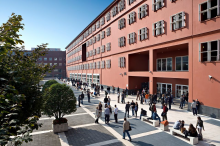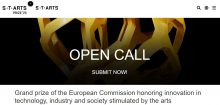Prof. Lorenzo Cantoni of Università della Svizzera Italiana is glad to announce the Massive Open Online Course (MOOC) on eTourism Communication Perspectives.
It is the very first MOOC covering the eTourism topic: a most needed one, considering the role plaid by Information and Communication Technologies within tourism and hospitality. Almost all cases discussed in this MOOC are from Heritage sites.
The course, fully free and open, will be delivered in October-November 2015; it will last 8 weeks and will require approximately three hours study time per week. Among the intended audiences: destination managers, people active in the tourism industry, policy makers, students (in particular within tourism and hospitality programmes) academics and researchers.
Prof. Lorenzo Cantoni, Dr. Nadzeya Kalbaska, Dr. Elena Marchiori and Dr. Silvia Matilde De Ascaniis will take you on a fascinating travel into the eTourism world, which crosses both space and time and is always closely connected with communication. The trainers are embarking to create a great study experience, which explores how Information and Communication Technologies do matter for tourism, both for our personal experience and for the tourism industry at large. In other words, they will explore eTourism together with you by using tools and models from the Communication Sciences.
Key concepts and theories covered include: Online Communication Model; Roman Jakobson’s Communication Model; Quality of online contents; User Generated Content; Web 2.0; Reputation in online Media; Intercultural Communication and Localisation; eLearning; Argumentation; World Heritage Sites.
As this is an introductory course, no prerequisite knowledge is necessary to participate.
By the end of the course, learners will know:
- what communication is and its major components, ICTs and their relevance to the tourism field
- how to be aware of the crucial role played by communication and ICTs within the tourism and hospitality sectors
- current eTourism applications, technologies and practices
- how to map different communication activities within the tourism sector
- what kinds of online training courses can be used for the knowledge upgrade within tourism and hospitality
- how to run a usability test and how to make usages analysis of a website or mobile app
- how to plan, run and evaluate eTourism related activities, especially when it comes to the analysis of online reputation of a tourism destination.
COURSE STRUCTURE:
Chapter 1. Communication: an introduction to its nature and history (October 5-9, 2015)
Instructor: Prof. Lorenzo Cantoni
① Theoretical part:
- The very etymology of communication and its two major components: producing and interpreting messages
- The model by Roman Jakobson
- The history of media up to ICTs
② Case study:
- UNESCO World Heritage Sites and eTourism
Chapter 2. The Online Communication Model (OCM) and the quality of online contents (October 12-16, 2015)
Instructor: Prof. Lorenzo Cantoni
① Theoretical part:
- The complexity and richness of online communication
- The Online Communication Model (OCM)
② Case study:
- Analysis of the content quality in online communication
Chapter 3. Usability analysis and web analytics (October 19-23, 2015)
Instructor: Prof. Lorenzo Cantoni
① Theoretical part:
- The usability and usages analysis of tourism websites, mobile apps and other online communication tools
② Case study:
- Usability analysis of a hotel’s booking engine
Chapter 4. Localisation of online content (October 26-30, 2015)
Instructor: Prof. Lorenzo Cantoni
Assistant: Emanuele Mele
① Theoretical part:
- Cultural translation/localisation of messages for people with various cultural backgrounds and experiences
② Case study:
- Localised website for domestic and international visitors of Quito, a Local Tourism Organisation in Ecuador
Chapter 5. B2B activities and eLearning: online educational communication (November 2-6, 2015)
Instructor: Dr. Nadzeya Kalbaska
① Theoretical part:
- The notion of eLearning and how it is being used for lifelong learning of tourism and hospitality students as well as of professionals in the field
② Case study:
- Ticino Switzerland Travel Specialist online course produced by a regional Tourism Organisation in Switzerland
Chapter 6. User Generated Contents (UGCs) & web 2.0 (November 9-13, 2015)
Instructors: Dr. Silvia de Ascaniis; Dr. Elena Marchiori
① Theoretical part:
- Communication opportunities given by Web 2.0
- Exploration of User-Generated-Contents (UGCs), by applying Roman Jakobson’s model
② Case study:
- Communication strategies for the management of hotel online travel reviews
Chapter 7. Reputation in online media (November 16-20, 2015)
Instructor: Dr. Elena Marchior
① Theoretical part:
- The definition of the reputation construct and its relevance in the online domain
- Current approaches and tools for the analysis of online reputation, both from qualitative and quantitative perspectives
② Case study:
- How to analyse the online reputation of a tourist destination
Chapter 8. Argumentation in online travel reviews (November 23-27, 2015)
Instructor: Dr. Silvia de Ascaniis
Assistant: Jingjing Lin
① Theoretical part:
- Definitions of argumentation
- How to run an argumentative analysis of Online Travel Reviews
② Case study
- Argumentative analysis of Online Travel Reviews of a Chinese National Park.







 If you have interesting news and events to point out in the field of digital cultural heritage, we are waiting for your contribution.
If you have interesting news and events to point out in the field of digital cultural heritage, we are waiting for your contribution.
























